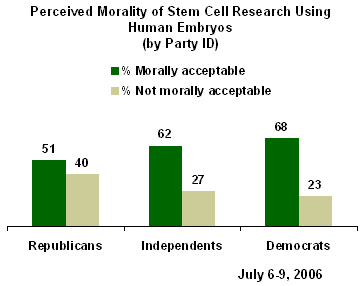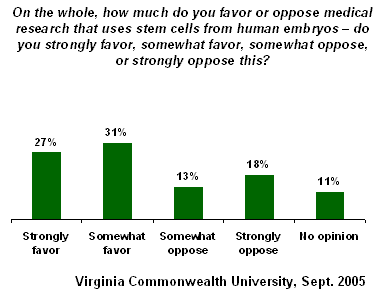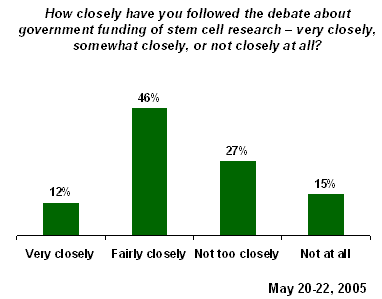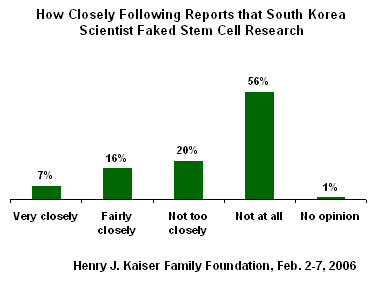GALLUP NEWS SERVICE
PRINCETON, NJ -- President Bush's veto, yesterday, of a bill that would have expanded federal funding of stem cell research puts him at odds with an American public that mostly favors greater research in this area.
According to a review of recent Gallup and other polling on the subject, Americans have a generally positive reaction to embryonic stem cell research. A solid majority (typically 60%) agrees with using stem cells derived from human embryos for medical research and 61% consider such research morally acceptable.
That's the general picture. More specifically, only 11% of Americans want unfettered government funding of embryonic stem cell research while another 42% support easing current restrictions. On the other side, 24% favor keeping the current restrictions while 19% want no funding whatsoever.
However, all of this does not necessarily mean there will be a strong public backlash against Bush over his veto. Because the issue is not highly important to most Americans - only 12% were following it very closely in May 2005 -- the public has, at different times, shown majority support for conflicting funding policies. For instance, at the time he proposed it in 2001, a majority of Americans (60%) favored President George W. Bush's plan for providing only very limited federal funding for embryonic stem cell research. More recently, a majority of Americans (53%) expressed support for the expansive state funding authorized by California voters in 2004 which, pending court challenges, provides $3 billion toward stem cell research, including embryonic-based research, over the next 10 years.
Key Subgroup Differences
The percentage saying embryonic stem cell research is morally acceptable is slightly higher among men than women (66% vs. 56%). However, the starkest differences are seen according to level of formal education and political groupings. Three-quarters of those with postgraduate degrees (77%) consider the research acceptable. The percentage drops to 67% among those with a less advanced college background and to 45% among those with a high school education or less.
Politically, support is highest among Democrats (68% saying morally acceptable) and independents (62%), but a smaller majority of 51% among Republicans.

Overall Importance as a Political Issue
Two-thirds of Americans say they would, in theory, support the use of embryonic stem cells if it could help themselves or a family member suffering from a condition such as Parkinson's or spinal cord injury. However, only a third of Americans personally know someone whom they believe could benefit from such treatments. This lack of a personal need for the research among most people could explain the lack of public demand for greater public funding.
A 2005 survey conducted by Virginia Commonwealth University found 58% of Americans in favor of "medical research that uses stem cells from human embryos," but only 27% "strongly" in favor. On the flip side, only 18% of Americans were "strongly opposed" to embryonic stem cell research, out of a total of 31% who were generally opposed.

Similarly, a May 2005 Gallup survey found 58% of Americans following the news about government funding of stem cell research closely, but only 12% following it "very closely."

Along the same lines, a recent survey sponsored by the Henry J. Kaiser Family Foundation found only 7% of Americans who were "very closely" following the news about the prominent South Korean scientist faking his stem cell research.

Fine Print
Embryonic stem cell research is only one type of medical research involving stem cells. Others rely on adult stem cells, including from bone marrow, umbilical cord blood, and adipose tissue (fat cells).
Proponents of embryonic stem cell research point to the unique nature of embryonic cells to transform into almost any type of cell (pluripotent) as holding the most promise for curing such life-threatening diseases as Parkinson's, diabetes, and spinal cord injury. They believe the potential medical advantages outweigh any possible moral issues involved in such use of human embryos.
Opponents object to embryonic stem cell use because they believe it involves the taking of an unborn human life. They point to medical advances that have already been made with adult stem cells, arguing that these methods are more likely to achieve significant medical treatments and cures, and without any ethical controversy.
The degree to which the public understands these complex distinctions is unclear. When asked in a September 2005 survey how familiar they are with the major types of stem cell research, only 22% of Americans said they are "very clear" about the differences. Another 44% profess to be "somewhat clear," while 32% say they are not very clear or not at all clear.
The same survey (sponsored by Virginia Commonwealth University Life Sciences) found no public consensus about which type of research offers the greatest promise for discovering new treatments for disease. Only 14% say embryonic stem cell research holds the most promise, while 7% say adult stem cells do, and 37% say "research using stem cells from other sources, such as an umbilical cord." However the largest percentage, 43%, is uncertain or cannot choose among the three types.
Related Attitudes
Embryonic stem cell research involves some of the same philosophical questions about human life that inflame the debates over abortion and human cloning. At what stage does life begin? Is it sacred? Should humans interfere with the natural process of human creation? Nevertheless, embryonic stem cell research is far less controversial with the public than either abortion or human cloning.
According to Gallup's latest polling, 61% of Americans consider stem cell research using human embryos to be morally acceptable, only 30% say it is morally wrong.
By contrast a majority of Americans are closely divided on the morality of abortion, with 43% saying it is morally acceptable and 44% saying it is wrong.
Embryonic stem cell research may meet with relatively less resistance because the intention is life affirming. The moral dilemma is between protecting an unborn life versus allowing research that could possibly extend an existing life, and the latter is more compelling for most Americans.
Survey Methods
These latest Gallup results are based on telephone interviews with a randomly selected national sample of 1,002 adults, aged 18 and older, conducted May 8-11, 2006. For results based on this sample, one can say with 95% confidence that the maximum error attributable to sampling and other random effects is ±3 percentage points. In addition to sampling error, question wording and practical difficulties in conducting surveys can introduce error or bias into the findings of public opinion polls.
Next, I'm going to read you a list of issues. Regardless of whether or not you think it should be legal, for each one, please tell me whether you personally believe that in general it is morally acceptable or morally wrong. How about -- [RANDOM ORDER]?
L. Medical research using stem cells obtained from human embryos
|
|
|
Depends on situation (vol.) |
Not a |
|
|
|
% |
% |
% |
% |
% |
|
|
2006 May 8-11 |
61 |
30 |
3 |
* |
6 |
|
|
|
|
|
|
|
|
2005 May 2-5 |
60 |
33 |
3 |
-- |
4 |
|
2004 May 2-4 |
54 |
37 |
3 |
* |
6 |
|
2003 May 5-7 |
54 |
38 |
3 |
-- |
5 |
|
2002 May 6-9 |
52 |
39 |
2 |
1 |
6 |
|
* Less than 0.5% |
|||||
|
(vol.) Volunteered response |
|||||
How closely have you followed the debate about government funding of stem cell research - very closely, somewhat closely, not too closely, or not closely at all?
|
Very |
Somewhat closely |
Not too closely |
Not |
No |
|
|
% |
% |
% |
% |
% |
|
|
2005 May 20-22 |
12 |
46 |
27 |
15 |
* |
|
|
|
|
|
|
|
|
2001 Aug 3-5 |
18 |
37 |
22 |
23 |
* |
|
2001 Jul 10-11 |
9 |
29 |
28 |
32 |
2 |
|
* Less than 0.5% |
|||||
As you may know, the federal government currently provides very limited funding for medical research that uses stem cells obtained from human embryos. Which would you prefer the government to do - [ROTATED: place no restrictions on government funding of stem cell research, ease the current restrictions to allow more stem cell research, keep the current restrictions in place, (or should the government) not fund stem cell research at all]?
|
|
|
|
Keep current restrictions |
|
|
|
% |
% |
% |
% |
% |
|
|
2005 May 20-22 |
11 |
42 |
24 |
19 |
4 |
|
|
|
|
|
|
|
|
2004 Oct 9-10 |
14 |
41 |
24 |
14 |
7 |